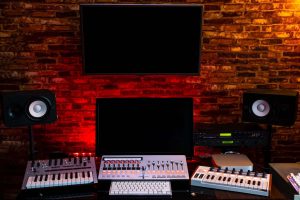I’m writing on this topic because often when new artists come into a studio setting for the first time, they’re confused about the differences between music producers and engineers. It’s essential that artists know the difference between the two so that they can manage expectations and know the right questions to ask when calling a studio or producer. Artists also don’t want to be in the position to waste time or money, or worse, not get the result they are after.
A music producer’s job is pretty broad, but in short a music producer is the person responsible for either creating the beat/track, or the instrumental/arrangements around your existing song (“song” = your melody + your lyrics). A lot of music producers are also composers andor songwriters, and can assist in the creation of melodies andor writing lyrics, though that’s not necess
arily a role a producer fills. If an artist requires assistance in songwriting, they should ask before booking a session to make sure everyone is on the same page in terms of their respective contributions to the songwriting process.
A recording engineer is the person in charge of recording the instruments and vocals, they are not there to help write melodies, lyrics, or help with the production or arrangements, though most engineers these days in the digital era are both music producers and recording engineers.
A mix engineer is responsible for mixing songs (obviously) and that basically just means taking the stems from an existing final production and processing them – blending all the parts to get them working together to make the song sound as good as possible. Stems are the individual tracks from a recording sessions, for example the kick drum as a separate track, the snare as a separate track, separate tracks for bass, guitars etc…) More separation is usually better for a mix engineer since a good engineer will use their processing abilities to create a professional-quality recording that is ready for radio, licensing, and digital distribution.
Mix engineers are the ones applying compressors, EQ, reverb, delay etc., though these can be also be used as part of the production. If you’ve ever been in a session with a music producer, you probably saw them use plugins like EQs and reverbs compressors.
Not all processing is created for mixing purposes, there are 2 types of processing:
–Mixing (as discussed above)
and
-creative purposes, for example, a producer will EQ to create a radio effect or will use a lot of reverb to create a huge sound as part of a creative decision vs as a mixing decision. Extreme processing can change the sound from a creative point of view, whereas a mix engineer is not charged with changing an artist’s sound creatively. Mix engineers are focused on getting your stems sound better together to match broadcast quality. Producers will often export the stem to include creative plugins, otherwise the mixengineer might not know it was there or how to recreate it.
Producers can also create a demo for the mix engineer to help him/her with a reference. In 2019 with all the new available technology, a certain degree of mixing is part of the production process, most music producers have basic knowledge on how to mix. Producers use that knowledge to help the mix engineermake the right decisions by providing a reference track for the eventual final mix. It’s easier for the mixengineer to have the reference and mix in a way that mirrors the reference, but with a focus on a final, cleaner broadcast-quality recording.
Another important fact you should be aware of is that a lot of people these days can be music producers, recording engineers and mixing engineers, or a combination of all three, though a lot of people think they are equally skilled in all of the above but may not be as skilled at all roles. Producing music requires a lot of talent; with a few years of experience you can be a pretty good music producer if you have the natural talent. Being a mix an engineer, however, requires a different set of skills; the ability to mix a song to a point where it is balanced correctly and sounds clean requires years and years of experience working with the right equipment and the right acoustic
environment. It’s extremely difficult for younger or inexperienced music producers to hear where they went wrong on a mix. Therefore, for many producers, it’s imperative that they or the artist hire a differentmix engineer to get the best sound possible.
Before an artist picks their next music producer recording studio engineer, it’s important that they be aware of the differences and ask the right questions. It’s even more importantly to listen to a producer’s work ahead of time and investigate if they were the ones producing and mixing the works they liked as sometimes producers will showcase work they didn’t mix and vise-versa.





